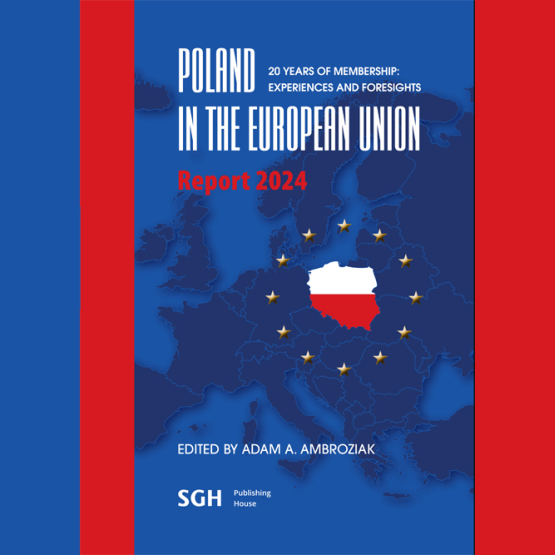
Both teaching and research activities at SGH Warsaw School of Economics are traditionally concentrated around topics of economics, management, or public policy. All these areas are immensely affected by the fact that currently the growth of the digital sphere is the fastest growing area of the economy.
Both teaching and research activities at SGH Warsaw School of Economics are traditionally concentrated around topics of economics, management, or public policy. All these areas are immensely affected by the fact that currently the growth of the digital sphere is the fastest growing area of the economy. According to the PwC (2021) Global Top 100 companies by market capitalization report four of the top five companies: Apple, Microsoft, Amazon, and Alphabet are all direct suppliers of computing technology or have products whose value is directly driven by it. And this is only a tip of an iceberg of information technology adoption. Currently, companies in virtually all industries, in order to stay competitive collect and analyze vast amounts of data.
This trend has also a significant impact on labor market. Following the changes on the employers’ side currently most of the jobs, especially in the domain of highly skilled workers, increasingly require computer literacy. Apart from transformation of traditional professions, new ones arise. Following Davenport and Patil (2012) already ten years ago it was realized that data scientist was to become one of the hottest jobs globally.
SGH Warsaw School of Economics, with its ambition of remaining in the vanguard in both education and research, has identified and embraced the digital transformation trend. The change we observe, is treated by our researchers as an opportunity to leap forward in comparison to international academic institutions with highest reputation. The reason is very simple: currently every university is facing the same transformation challenge, so the playing ground is more level than 30 years ago. As new technologies emerge they have to be understood and can be made use of in exactly the same way regardless of where the academic researcher resides. There is one prerequisite though. In order to competently teach and study newest technological advancements fundamental skills in mathematics and computer science are essential. Fortunately, the SGH Warsaw School of Economics has had very long tradition, dating back over 50 years now, of attracting researchers interested in social applications of mathematics and information technology, with the founding fathers such as Tadeusz Czechowski, Wiesław Grabowski, Jerzy Greń, Michał Kolupa, Ireneusz Nykowski, and Wiesław Sadowski. Therefore we started with a solid foundation in the digital transformation arms race.
By now you are most likely curious what is currently happening at our university in this domain. There are numerous activities that are undertaken and I would not want to omit any significant ones. Therefore I will discuss only selected ones, that are representative types in both research and education domains.
In the domain of research as a starting point I would like to highlight the works of Jakub Growiec who is doing research on the fundamental level trying to understand how the changes we face in digital age can be expected to influence the long term growth. In recognition of his contributions he has recently been awarded a National Science Center award and invited to become an Intercontinental Academia Intelligence and Artificial Intelligence fellow.
Let me also mention another distinguished researcher – Marcin Kolasa – who is an expert in applying analytical methods in the area of macroeconomics. Marcin is currently a board member of highly recognized Society of Computational Economics, is in particular a publisher of such leading scholarly journals as “Journal of Economic Dynamics” and “Control, Journal of Applied Econometrics and Computational Economics”.
This list could be much longer, so let me just mention that researchers from SGH Warsaw School of Economics are actively involved in such large international societies that focus on computational methods as Institute for Operations Research and the Management Sciences or European Social Simulation Association, Confederation of Laboratories for Artificial Intelligence Research in Europe, or Global Partnership on Artificial Intelligence.
It is important that we try to not only be technology takers thinking how it can be applied in various social contexts, but also actively contribute to their development. This is a new and rapidly raising trend in academia, where researchers engage in software development projects, typically using the open-source model. Its significance is quite easy to understand. While typical academic papers are read by at most hundreds of people, high quality open-source projects are employed by thousands users and have a direct application to help them solve their problems. Personally, I am convinced that this way of sharing academic advancements paves the way to their vast adoption by the societies globally.
Let me give two examples of such projects that are actively maintained by our researchers. The first one is SilverDecisions, which is an on-line application helping people to make better decisions. The users of this software employ it to model complex decision making problems and get recommendations on the best course of actions. As of time of writing it, SilverDecisions has had over 100,000 users from virtually all countries in the world. The second example is the ecosystem of data analysis solutions developed using the Julia language. SGH Warsaw School of Economics researchers significantly contribute to the development of the language, as well as its package ecosystem. The developed tools are created to radically change how future generations of data scientists will practice their trade. The Julia language has millions of downloads and the number of downloads of the data science packages is in total over 100,000 only in year 2021. Currently it is reported that over 10,000 companies globally use this technology including such industry leaders as e.g. AstraZeneca, Blackrock, IBM, NASA, NASA, NY Federal Reserve, or Pfizer. I personally have been awarded the Julia Community Prize for the custodianship of the Julia data science ecosystem this year.
The activities in the field of software development not only directly contribute to the society, but also foster academic exchange. Using them as a foundation only in the Decision Analysis and Support Unit, that I am a member of we currently have established several long lasting cooperations with academic institutions such as: MIT, Ryerson University, Fields Institute, Loyola University Chicago, Salerno University. Additionally, the experience gathered in such projects and cooperation has a direct impact on teaching curriculum.
In the area of education let me highlight the flagship Big Data – Advanced Analytics master’s program that has been offered to our students for several years already. The research activities I have discussed above are constantly taken advantage of in teaching, where we are able to offer courses that present both best practices and next practices of data scientists, preparing our students to be ready for even the most challenging projects. However, the academic offer for students does not end at courses. Using the established partnerships we are able to offer our students opportunities to learn from the best experts in the world. For instance we have established a dual-diploma doctoral program between Ryerson University and SGH Warsaw School of Economics and our students constantly take part in numerous international research projects funded both by Polish and international institutions.
In conclusion, I think it can be confidently stated that SGH Warsaw School of Economics has taken advantage of digital transformation of economy. Our researchers get involved in projects that address the core challenges stemming from the computational revolution. This significantly improves the recognition of our Alma Mater on international level both in academia and industry. But it is not the only benefit. Our students can expect that they are given the opportunity to acquire state of the art knowledge and skills that will make them ready to undertake even the most challenging projects of the modern world.
Professor BOGUMIŁ KAMIŃSKI, Head of Decision Analysis and Support Unit, Chairman of the Scientific Council for the Discipline of Economics and Finance, SGH Warsaw School of Economics
References:
PWC (2021): Global Top 100 companies by market capitalization, https://www.pwc.com/gx/en/services/audit-assurance/publications/global-top-100-companies.html
T.H. Davenport and D.J. Patil (2012): Data Scientist: The Sexiest Job of the 21st Century, Harvard Business Review, https://hbr.org/2012/10/data-scientist-the-sexiest-job-of-the-21st-century



